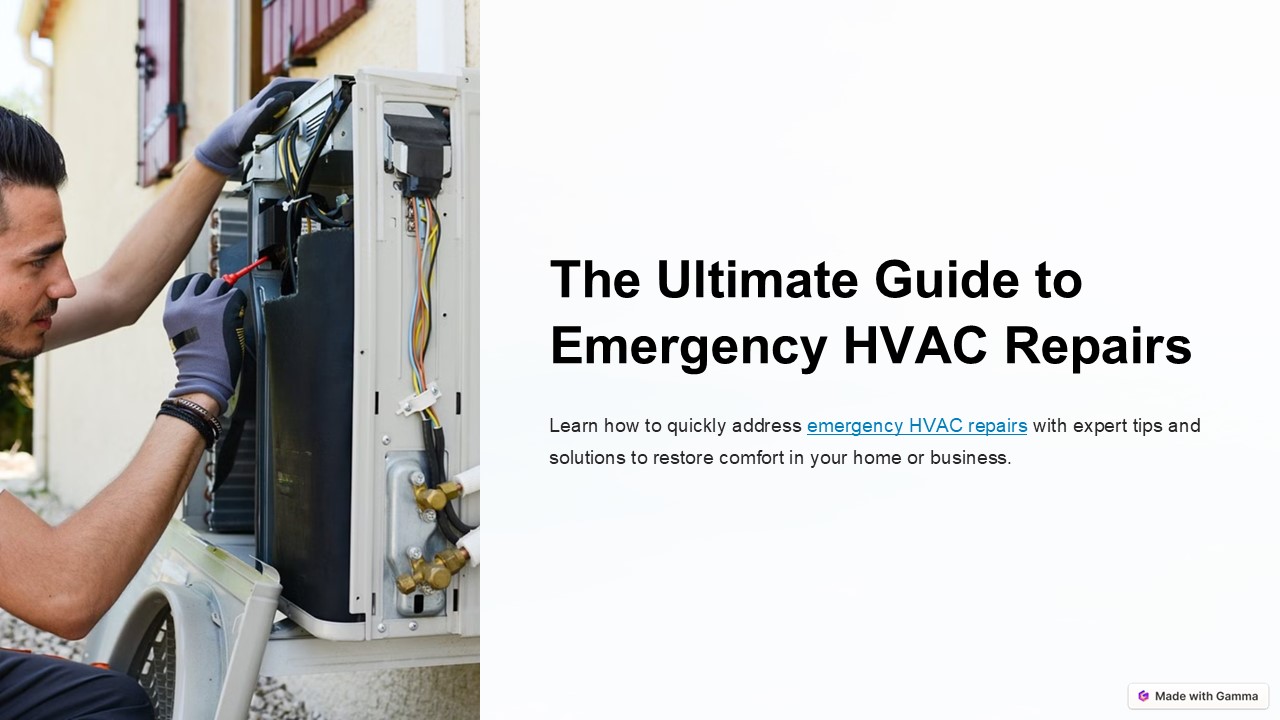The-Ultimate-Guide-to-Emergency-HVAC-Repairs - PowerPoint PPT Presentation
Title:
The-Ultimate-Guide-to-Emergency-HVAC-Repairs
Description:
Explore expert strategies and solutions in "The Ultimate Guide to Emergency HVAC Repairs" to handle unexpected HVAC issues efficiently and restore comfort quickly. – PowerPoint PPT presentation
Number of Views:0
Date added: 2 January 2025
Slides: 9
Provided by:
ACScomfort
Category:
How To, Education & Training
Tags:
Title: The-Ultimate-Guide-to-Emergency-HVAC-Repairs
1
The Ultimate Guide to Emergency HVAC Repairs
Learn how to quickly address emergency HVAC
repairs with expert tips and solutions to restore
comfort in your home or business.
2
Common HVAC Emergencies
No Heat or Air Conditioning
Unusual Noises
Loud banging, grinding, or whistling sounds are
signs of a serious issue.
The most common emergency is a complete lack of
heating or cooling.
High Energy Bills
Water Leaks
A sudden spike in your energy bill can indicate a
system inefficiency.
Dripping or pooling water around your unit could
signal a refrigerant leak.
3
Preparing for HVAC Emergencies
Emergency Contact Information
System Manual
Basic Tools
Safety Precautions
Familiarize yourself with your HVAC system's
manual for troubleshooting tips.
Gather basic tools like a screwdriver, wrench,
and flashlight for minor repairs.
Understand the safety risks associated with
working on electrical systems.
Keep a list of qualified HVAC technicians and
their contact information.
4
Diagnosing HVAC Issues
Check the Thermostat
1
2
Inspect the Air Filter
3
Examine the Circuit Breaker
4
Look for Obstructions
5
Verify Refrigerant Levels
5
Temporary Fixes for HVAC Problems
Reset the Thermostat
Change the Air Filter
Sometimes a simple reset can fix minor issues.
A clogged filter restricts airflow, leading to
inefficiency.
Check the Circuit Breaker
Clear Obstructions
A tripped breaker can cut off power to your unit.
Debris around the unit can hinder its performance.
6
Finding a Qualified HVAC Technician
Online Reviews
Professional Organizations
Read customer reviews on websites like Yelp or
Angie's List.
Check with organizations like the National
Association of Home Builders.
Word-of-Mouth Recommendations
Licensing and Certifications
Ask friends, family, or neighbors for referrals.
Verify that technicians have the necessary
licenses and certifications.
7
Steps to Resolve Emergency HVAC Repairs
Contact a Technician
Reach out to a qualified HVAC technician.
Provide System Information
Give details about your unit and the problem.
Schedule an Appointment
Set up a convenient time for the technician to
arrive.
Repair or Replacement
Discuss the repair or replacement options.
8
Preventing Future HVAC Emergencies
Regular Maintenance
1
Schedule annual maintenance checks with a
qualified technician.
Clean Air Filters
2
Change air filters regularly according to
manufacturer's instructions.
Inspect Outdoor Unit
3
Ensure the outdoor unit is clear of debris and
obstructions.
Monitor Energy Consumption
4
Keep an eye on your energy bills for any unusual
spikes.































